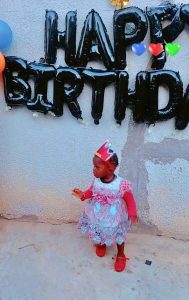One hot afternoon in late October 1998, in a dusty courtyard in Segou, Mali, I baked a chocolate birthday cake.
This was quite a défi (“challenge,” in the ligua franca of this Francophone West African country) because all of the cooking for my host family’s meals was done outside on an open wood fire in their enclosed compound’s courtyard. There was no kitchen. There was no oven. There was no table for prepping, nor was there the requisite kitchen equipment. I had no cake pans.
What I did have though was my innate stubborn determination to bake a cake for my friend Youssef’s thirty-third birthday and to make a party of it for his large and welcoming family.
Word got out about this event in the neighborhood, and before long the courtyard was filled with many young Malian mothers (curious, perhaps, to learn how to bake a birthday cake) and their many, many little children. The children sat close together, cross-legged on the dusty ground, looking up at me expectantly, waiting quietly and patiently for their taste of cake.
Somehow, the cake gods were with me, because, after rigging up a large cauldron like an oven and cooking the batter in the big bowl I’d mixed it in (which I set on tin cans at the bottom of the dry, closed cauldron), a fat, domed chocolate cake emerged (when flipped), like some sweet dark miracle.
I drizzled the dome with melted chocolate bars, stuck a white candle in the top, and displayed it triumphantly like a trophy. The mothers were amazed. The children got excited. I cut the cake into thirty-six tiny pieces, hoping each child might at least get a taste. In an instant the cake was gone. Merely a memory.
One of those children, the eldest son of Youssef’s older cousin Makan, the patriarch of my host family, was eleven-year old Tidiani, a serious and shy boy who seldom spoke but obviously observed and privately recorded everything.
Today, twenty-five years later, Tidiani is a responsible married man in his mid-thirties with two small children, the second of whom is a baby girl he named after me. As I wrote in my WOW blogpost, “The Christmas Gift,” a year ago, shortly after her birth (www.blog.bonnieleeblack.com/the-christmas-gift/ ):
“The tradition in Mali, as I came to understand it in my three years there, is for foreign residents to take on Malian names and thereby become part of the overall Malian family, regardless of one’s age, skin color, ethnicity, nationality, or religion.” I chose for myself the name Bani because it’s pronounced just like my actual first name and because it’s the name of the sister river to Mali’s mighty Niger.
My little namesake Bani turned one year old last week. I’d sent her dad Tidiani, who’s been a Facebook friend for many years, a little money via Western Union for her birthday, and he thanked me by sending me photos and videos of the birthday party he and his wife made for her with the money I’d sent.

There she was, striding across the courtyard alone on her slim-but-evidently-sturdy one-year-old legs, wearing red mary janes, a lacey dress, and a pointy paper crown. (My mom always claimed I was walking, talking, and out of diapers by my first birthday; but I have no videos to confirm this.)
And there she was, sitting alone at a small table in front of her big, round birthday cake emblazoned with her name and “Joyeux Anniversaire,” looking a bit bewildered as well as bedazzled as the gathered crowd of kids sang “Happy Birthday to You” – in English! – no doubt coached by her daddy Tidiani and meant for me.
Her face, looking up, reads, What’s going on here? – the same quizzical expression I always saw in my own baby pictures. She’s not, it appears, loving being the center of attention.
Someone places a white candle in the center of the cake, lights it, and encourages her to blow it out. Her body language says to me: Wait! What? What’s happening? And then she takes off her paper crown and plops it on the ground beside her. She’s determined not to be a princess.
You could accuse me, rightly, I guess, of reading too deeply into Bani’s first birthday photos and videos to find likenesses with myself: The same stubborn determination to be who we are (not princesses), to walk alone on our own two sturdy legs unaided, to question everything (What’s going on?) and recoil from the limelight. She and I are not connected by blood, but I like to think we’re connected by more than just first names.

One of the good things about getting old, I’m finding, is this: If you live long enough, you begin to see life’s circular patterns more clearly (“What goes around, comes around”?).
Some of those circular patterns are beautiful, like this one, in the shape of a round birthday cake.
~ ~ ~ ~ ~ ~ ~ ~ ~ ~
For the full account of my experiences in Mali, read HOW TO MAKE AN AFRICAN QUILT: The Story of the Patchwork Project of Segou, Mali, available at Aurora Books in San Miguel de Allende or online from Amazon.com or the publisher Nighthawk Press (http://nighthawkpress.com/all-authors/bonnie-lee-black/ ).
